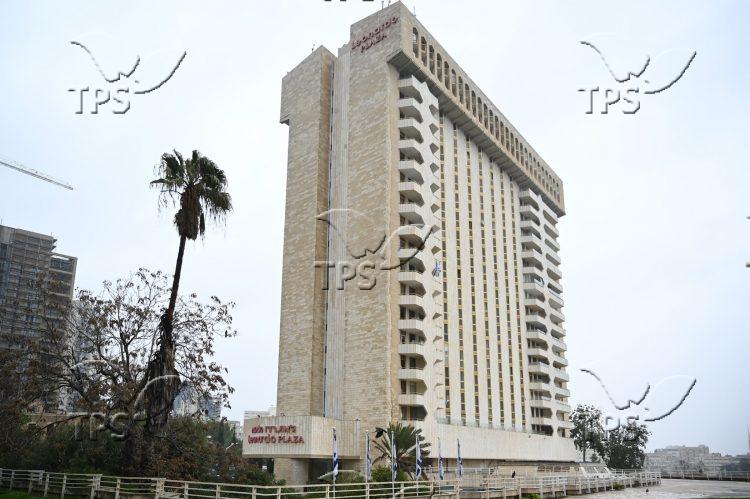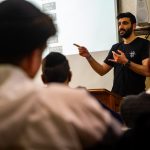For Israeli Evacuees, Life Goes on at the Leonardo
Jerusalem, 25 December, 2023 (TPS) -- The first thing you might notice about the Leonardo Plaza Hotel in downtown Jerusalem are the school buses parked in the loading circle outside. Security is tighter than it was before the war, and as usual, the massive lobby is spotless, smelling pleasantly of spa products.
The next thing you might notice is a small memorial table with candles, photos of the kidnapped and the fallen, Israeli flags and information about Kfar Maimon and Tushiya, communities whose residents have taken up residence at the Leonardo.
The hotel is booked to capacity. Eighty percent of the guests are refugees from these two moshavim, which were hard-hit by Hamas’s savage Oct. 7 attack. The other 20% are the usual array of hotel tourists and guests.
Sigal, one of the community organizers lodged at the Leonardo, along with her husband and two children, longs to return home but realizes that right now that’s impossible. Many of the communities’ homes were damaged or destroyed during the attack, and so far only farmers and security teams have returned.
“While it’s nice to stay in a hotel, living in one room is hard for the children,” said Sigal, a holistic therapist by profession. “From the beginning, we all had to deal with shock, and we had to create an emotionally supportive environment for the children. Social workers from Jerusalem’s municipality were brought to us. I tell people to look at the positive—what a privilege to be housed here in Jerusalem!”
On the day of the attack, Sigal didn’t know what was happening. There were no sirens. They heard shooting and were warned to go into lockdown. She thought perhaps a terrorist had broken into the village.
Little did she know that approximately 60 terrorists had infiltrated and were deployed in the cemetery of Kfar Maimon. The story might have ended differently if the terrorists hadn’t tried to shoot down an Israeli Air Force helicopter, which was headed elsewhere but instead descended and engaged the terrorists, eventually stopping the attack.
At the hotel, a guest rolls a carry-on, an M-16 assault rifle slung over his shoulder. At the bottom of the spiral staircase, the dining room fills up with children on their way to school, sporting colorful backpacks. A religious man is hunched over his daily Talmud learning and humming out loud.
Ortal Noah Moalam, CEO of the Leonardo Plaza Jerusalem, gets her first hug of the day from a 9-year-old girl bedecked in a sparkling pink rucksack. She said it is one of many greetings she gets each day from grateful children from the south, who always stop by to say hello.
“We opened a sandwich station at the breakfast buffet to accommodate the preparations of lunches and snacks for school,” said Moalam. She pointed to one father who had amassed a pile of breakfast rolls. “He’s making omelet sandwiches for his children. And the omelet chef already knows how each of his children likes their omelet,” she said.
The Leonardo Plaza, part of the Fattal chain, is one of its 48 hotels hosting 20,000 evacuees from the north and the south.
Moalam recalled, “Sukkot is always the most important holiday at our hotel, and we were fully booked this year. On Oct. 7 as news of the Gaza invasions was broadcast, both hotel staff and guests panicked.
“We understood the crisis right away, and we had to create internal calm. Everybody, including the executive staff, pitched in to clean, cook and help in any way we could. The chain asked how many rooms were available for refugees, and as tourists left we got the rooms ready for families,” she said.
Moalam worked side-by-side with staff, which was reduced because many Israelis had been called up for military reserve duty, while many Arab workers did not show up.
Evacuees, with just the shirts on their backs, began to arrive en masse with their families, mostly from Kfar Maimon, which had been evacuated due to its close proximity to Gaza. By Thursday, Oct. 12, the hotel had 700 people. All 450 rooms were fully booked. Dog owners even brought their pets.
“We receive significant support from the Jerusalem Municipality and the Jerusalem Development Authority,” explained Moalam. “They assigned a representative who arrives at the hotel every morning and assists families with everything they need, from support in all matters, education, planning and implementing recreational activities, psychological services, therapy and more.”
She added that in addition to supporting the promotion of the hotels, the Jerusalem Development Authority will help transition Jerusalem hotels back to serving the 5 million tourists expected in 2024 as the tourism industry recovers.
Community organizers from the villages were appointed to handle different aspects of evacuee life—ranging from security, work, psychotherapy, school matters, laundry and booking entertainment. Along with the Jerusalem municipality they set up four daycare/nursery/kindergartens within the hotel, and arranged for the older children to attend and be transported to school at Yad Vashem, which is hosting a temporary school for evacuees.
The first week after the evacuation, Joe Hammer, a Brooklyn philanthropist, paid for all the available hotel rooms at the Leonardo, and donated hygienic products, baby food and more to the evacuees. Eventually, the state assumed the costs and the hotel asked the government to provide for renovations after the families return to their homes.
Donations poured in, and Moalam stockpiled and distributed them methodically, creating a free “store” for evacuees. “The people from the south were not used to winter in Jerusalem,” recounted Moalam. “They came in short sleeves and had no warm clothing.” Toys came in for the children. She gave them out slowly so as not to deplete the supply before Chanukah.
Two and a half months later, the families have established routines and have celebrated life events—working the community into a cohesive family. Men go to war or to work. Women take care of the children. Some are paid to teach or maintain the nursery schools. Others volunteer in the hotel. One 80-year-old resident said, “I’m old and I can’t do much, but I can read stories to the children.”
Lavish meals are provided in the dining room. David Fattal, founder of Fattal Hotels, Israel’s largest hotel chain, came to visit the first week of the evacuation and urged the staff to provide more food. Fattal offered the hotel chain’s entertainment contacts to perform for the guests.
On Oct. 8, Jerusalem Mayor Moshe Lion asked Moalam, “How can I help?”
“We need more parking,” was her response.
“He came in three hours to assess the situation and offered us free parking in the neighborhood,” she said.
Rivik Boim is the emergency spokesperson for Kfar Maimon. She was on the team that informed people to lock down on Oct. 7. The mother of seven recently celebrated her son’s wedding at the Leonardo after the venue they had booked was shut down because of the war.
“We had the chuppah here in the lobby, and dinner and dancing downstairs,” she recalls joyfully as she gently rocks her one-month-old granddaughter in the carriage. “She was born to my daughter who is also living at the hotel,” she said. The December wedding was scaled back from 450 to 200 people, as most of the couple’s friends were in the army.
According to Moalam, five babies and one wedding have been celebrated among the community residents of the hotel so far. The hotel celebrates along with the families for their life-cycle events. While no one knows exactly how long the evacuees from the north and south will remain in hotels, it is hoped that most will be back in their villages sometime within the first quarter of 2024.”







